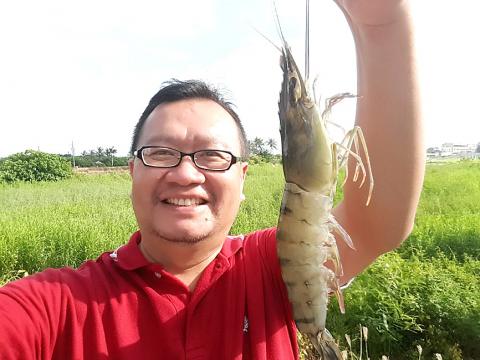An aquaculturist from Tainan’s Taijiang District (台江) this month received a Council of Agriculture certificate of provenance for his farm-reared giant tiger prawns, a rarity in Taiwan’s declining prawn industry.
Yen Jung-hung (顏榮宏), an aquafarmer with a degree in mathematics from the National Cheng Kung University, marine biotechnology and resources from National Sun Yat-sen University and 10 years of industry experience, said that he believes he can revive Taiwan’s once-prosperous prawn industry by updating it with modern technology.
Giant tiger prawns are considered technically challenging to raise in a farm environment because of their sensitivity to chemicals and antibiotics, Yen said.

Photo: Tsai Wen-chu, Taipei Times
Taiwan’s formerly thriving prawn industry was nearly wiped out by nation wide viral outbreaks, Yen said, adding that aquafarmers usually grow prawns with giant groupers to mitigate business risks.
A 1 hectare grow-out pond is capable of supporting up to 50,000 giant tiger prawns, of which only 10 to 25 percent grow to a size fit for human consumption. A typical farm harvests the prawns when they weigh between 15g and 20g each, Yen said.
In contrast, Yen said his giant tiger prawns weigh an average of 100g, which is “possibly the maximum size for farm-reared tiger prawns.”
His products are highly sought-after and sell at about four times the market price at NT$1,300 per jing (600g). Customers have to place an order with payment prior to delivery, Yen said, adding that demand frequently outstrips his supply.
Yen said his success is the result of an advanced electrochemical-electrocoagulation filtration system and a special mix of microbes cultured at the aquafarm, which he set up after extensive research and consultation with scientific authorities in the field.
The combination of techniques has allowed his prawns to feed on natural food sources and stay healthy, he said.
Council of Agriculture officials were initially skeptical and investigated the possibility that the prawns were foreign imports, Yen said, adding that after an inspection of his facility they were convinced the prawns were a domestic product.

Taiwan’s Liu Ming-i, right, who also goes by the name Ray Liu, poses with a Chinese Taipei flag after winning the gold medal in the men’s physique 170cm competition at the International Fitness and Bodybuilding Federation Asian Championship in Ajman, United Arab Emirates, yesterday.

Costa Rica sent a group of intelligence officials to Taiwan for a short-term training program, the first time the Central American country has done so since the countries ended official diplomatic relations in 2007, a Costa Rican media outlet reported last week. Five officials from the Costa Rican Directorate of Intelligence and Security last month spent 23 days in Taipei undergoing a series of training sessions focused on national security, La Nacion reported on Friday, quoting unnamed sources. The Costa Rican government has not confirmed the report. The Chinese embassy in Costa Rica protested the news, saying in a statement issued the same

A year-long renovation of Taipei’s Bangka Park (艋舺公園) began yesterday, as city workers fenced off the site and cleared out belongings left by homeless residents who had been living there. Despite protests from displaced residents, a city official defended the government’s relocation efforts, saying transitional housing has been offered. The renovation of the park in Taipei’s Wanhua District (萬華), near Longshan Temple (龍山寺), began at 9am yesterday, as about 20 homeless people packed their belongings and left after being asked to move by city personnel. Among them was a 90-year-old woman surnamed Wang (王), who last week said that she had no plans

TO BE APPEALED: The environment ministry said coal reduction goals had to be reached within two months, which was against the principle of legitimate expectation The Taipei High Administrative Court on Thursday ruled in favor of the Taichung Environmental Protection Bureau in its administrative litigation against the Ministry of Environment for the rescission of a NT$18 million fine (US$609,570) imposed by the bureau on the Taichung Power Plant in 2019 for alleged excess coal power generation. The bureau in November 2019 revised what it said was a “slip of the pen” in the text of the operating permit granted to the plant — which is run by Taiwan Power Co (Taipower) — in October 2017. The permit originally read: “reduce coal use by 40 percent from Jan.